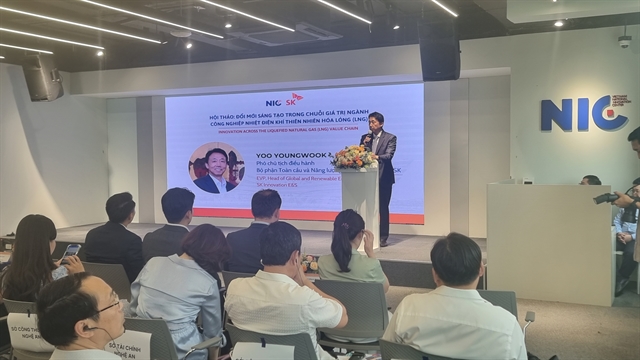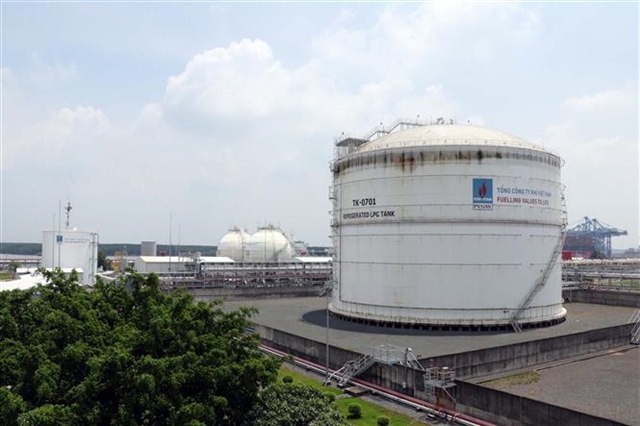On the afternoon of May 21, the National Innovation Centre (NIC) under the Ministry of Finance, in collaboration with South Korea's SK Group, held a thematic seminar titled “Innovation in the value chain of the LNG power industry”.

HÀ NỘI — As Việt Nam faces growing electricity demand alongside its net-zero greenhouse gas emissions commitment by 2050, liquefied natural gas (LNG) is increasingly seen as a vital transitional energy source.
This assessment by Đỗ Tiến Thịnh, Deputy Director of the National Innovation Centre (NIC), formed the focal point of the thematic workshop “Innovation in the value chain of the LNG power industry” held on May 21 in Hà Nội.
The event was jointly organised by NIC and South Korea’s SK Group as part of the “Cooperation and Knowledge Sharing for Future Industries” programme. It attracted around 100 participants from ministries, research institutes, businesses, and international energy organisations, including Korean experts.
Thịnh said, “The workshop aims to clarify the role of LNG under Việt Nam’s Power Development Plan VIII, introduce cutting-edge technologies in the LNG industry, and foster Việt Nam–Korea business connections across the LNG value chain. It also provides a platform to discuss international practices in investment and contracting, paving the way for sustainable and efficient LNG development in Việt Nam.”
As a strategic partner in this cooperation, SK Group shared its global LNG value chain experience and reaffirmed its commitment to supporting Việt Nam’s energy transition.
Yoo Youngwook, Executive Vice President of SK’s global and renewable energy division, stated, “We hope to expand investment in Việt Nam and support the country in its journey towards a net-zero future by 2050.”
SK is currently exploring large-scale LNG power plant projects in Việt Nam, with ambitions to establish new energy hubs integrating AI, logistics, hydrogen, environmentally friendly agriculture, and other innovative solutions.

“These projects are expected to generate positive impacts, not only by supporting Việt Nam’s socio-economic development, ensuring energy security, boosting key industries, attracting investment, cutting CO₂ emissions, and creating jobs, but also by improving the trade balance with major economic partners through LNG imports,” Yoo said.
From an international perspective, Keith Mark Doten, Director of Transaction Advisory at PwC, commented, “Việt Nam is increasingly integrating into the LNG market. With its high energy storage capacity and reduced harmful emissions, LNG presents a more environmentally friendly and cost-effective solution. Recent advances in liquefaction and shipbuilding technologies have accelerated the sector’s growth, making long-distance gas transportation more economically viable. In the near future, LNG may be applied across multiple sectors in Việt Nam, helping the country meet its net-zero emissions commitments.”
As a policy and technology bridge, NIC pledged to continue fostering a clean energy ecosystem in Việt Nam.
“We will focus on sharing knowledge, connecting experts, businesses, and global partners to promote deep cooperation and stay abreast of trends and innovations. This effort supports the government’s energy transition and sustainability goals,” Thịnh added.
Delegates at the workshop unanimously agreed that transitioning from coal to LNG aligns with global energy trends. According to its Power Development Plan VIII, Việt Nam targets a shift of 18 GW of coal-fired power capacity by 2030, to be replaced by 14 GW of LNG-fired power and 12–15 GW of renewable energy — a move considered critical in building a low-carbon and sustainable economy. — VNS





